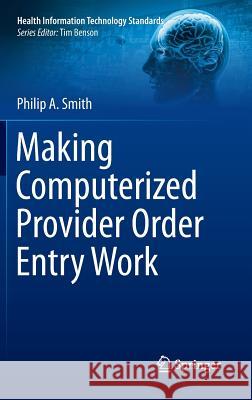Making Computerized Provider Order Entry Work » książka
Making Computerized Provider Order Entry Work
ISBN-13: 9781447142423 / Angielski / Twarda / 2012 / 196 str.
Making Computerized Provider Order Entry Work
ISBN-13: 9781447142423 / Angielski / Twarda / 2012 / 196 str.
(netto: 191,21 VAT: 5%)
Najniższa cena z 30 dni: 192,74
ok. 16-18 dni roboczych.
Darmowa dostawa!
Despite all the jokes about the poor quality of physician handwriting, physician adoption of computerized provider order entry (CPOE) in hospitals still lags behind other industries' use of technology. As of the end of 2010, less than 22% of hospitals had deployed CPOE. Yet experts claim that this technology reduces over 80% of medication errors and could prevent an estimated 522,000 serious medication errors annually in the US. Even though the federal government has offered $20 billion dollars in incentives to hospitals and health systems through the 2009 stimulus (the ARRA HITECH section of the American Recovery and Reinvestment Act of 2009), many organizations are struggling to implement advanced clinical information systems including CPOE. In addition, industry experts estimate that the healthcare industry is lacking as many as 40,000 persons with expertise in clinical informatics necessary to make it all happen by the 2016 deadline for these incentives. While the scientific literature contains numerous studies and stories about CPOE, no one has written a comprehensive, practical guide like Making CPOE Work. While early adopters of CPOE were mainly academic hospitals, community hospitals are now proceeding with CPOE projects and need a comprehensive guide. Making CPOE Work is a book that will provide a concise guide to help both new and experienced health informatics teams successfully plan and implement CPOE. The book, in a narrative style, draws on the author's decade-long experiences of implementing CPOE at a variety of academic, pediatric and community hospitals across the United States.











